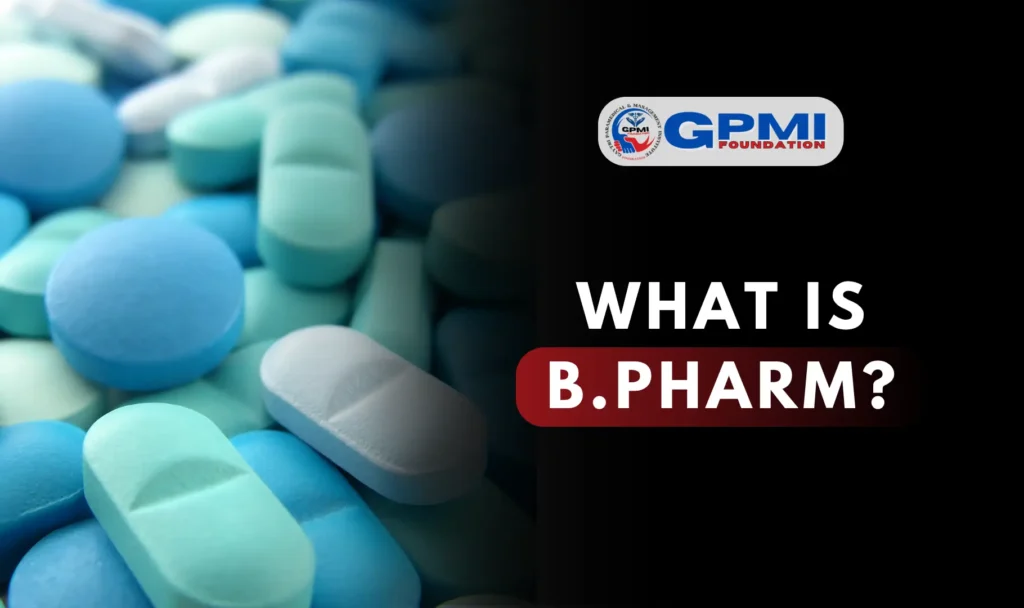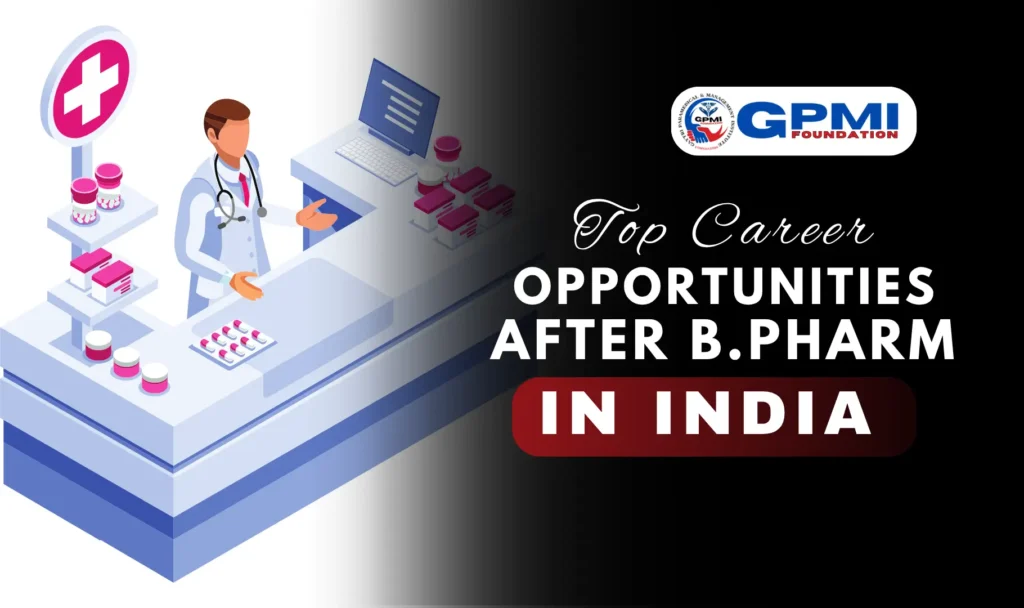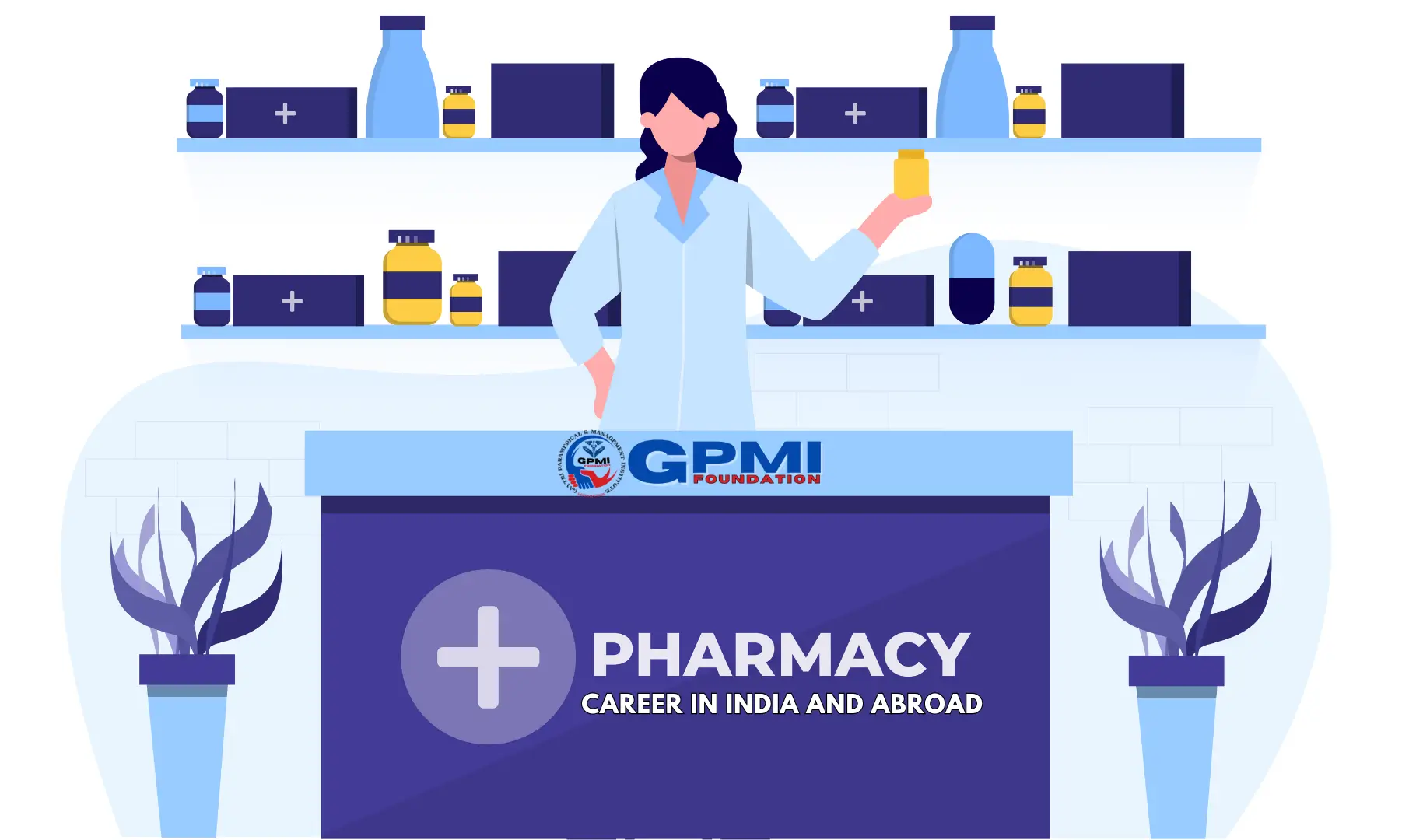Are you thinking about a career in pharmacy after 12th science? If yes, then the Bachelor of Pharmacy (B.Pharm) course can be the right choice for you. Pharmacy is not just about medicines — it’s about helping people live healthier lives.
In this course, you learn how medicines are made, how they work in the body, and how to use them safely. Once you complete B.Pharm, you don’t just have to work in a medical store or chemist shop.
There are many exciting job options available both in India and abroad. You can work in hospitals, research labs, government health departments, pharmaceutical companies, or even go into teaching. You can also become a drug inspector or apply for government pharmacist jobs.
Many students also go for higher studies like M.Pharm or MBA in Healthcare. If you are interested in science and want a respected, stable, and growing career, then B.Pharm can open many doors for you.
Table of Contents
Before we move ahead, it’s important to understand what B.Pharm is. Knowing the basics of this course will help you make a smarter decision based on your interests and compare it with other career options to choose the best path for your future.
What is B.Pharm?

B.Pharm stands for Bachelor of Pharmacy. It is a 4-year undergraduate degree for students who have completed their 12th with Science stream (Physics, Chemistry, and Biology or Math). The course is all about medicines, healthcare, and drug treatment. It teaches students how medicines are made, how they work inside the body, and how to give the right medicine to the right patient.
B.Pharm is the basic step if you want to become a pharmacist, work in a pharmaceutical company, or even go into medical research or drug safety. The course also covers topics like human anatomy, pharmacology, chemistry, and pharmacy law.
After completing B.Pharm, students can work in hospitals, government health departments, chemist shops, drug manufacturing companies, or even pursue higher studies like M.Pharm, MBA in Healthcare, or go abroad for further education.
In short, B.Pharm is a career-building course for students who are interested in science, health, and making a difference in people’s lives.
B.Pharm Course Details?
If you’re interested in building a career in the pharmaceutical or healthcare field, understanding the B.Pharm course structure is important. Let’s take a closer look at its key details and subjects.
| Aspect | B.Pharm Course Details |
|---|---|
| B.Pharm Full Form | Bachelor of Pharmacy (B.Pharm) |
| B.Pharm Course Duration | 4 years (8 semesters) + mandatory 1‑ to 2‑month industrial/ hospital training |
| B.Pharm Eligibility | 12th grade (PCM/PCB) with minimum 45–50 % aggregate; some colleges require entrance tests (e.g., GPAT, state CET) |
| B.Pharm Syllabus | Human Anatomy & Physiology, Pharmaceutical Chemistry, Pharmacology, Pharmacognosy, Pharmaceutics, Biochemistry, Microbiology, Hospital & Community Pharmacy, Pharmaceutical Jurisprudence |
| Average Fees (India) | ₹60,000 – ₹2 lakh per year (private) ; ₹30,000 – ₹80,000 per year (government) |
| Typical Admission Process | 1. Online application → 2. Entrance exam / merit list → 3. Counseling & document verification → 4. Fee payment & enrollment |
| Accreditation/Regulators | Approved by the Pharmacy Council of India (PCI) and—where applicable—All India Council for Technical Education (AICTE) |
| B.Pharm Jobs & Career Paths | Retail Pharmacist, Hospital Pharmacist, Drug Inspector, Quality Control Analyst, Clinical Research Associate, Medical Sales Representative, Production Executive |
| Higher‑Study Options | M.Pharm (various specializations), Pharm.D (Post‑Baccalaureate), MBA (Pharma/Healthcare), M.S. in regulatory affairs or drug discovery (abroad) |
| jobs after b.pharm and salary | Starting salary ranges from ₹2.5 – ₹4.5 LPA in India; can increase to ₹6–10 LPA with experience or after postgraduation; salaries abroad are significantly higher (USD 40,000–70,000 per year depending on the country) |
Why Choose B.Pharm?
There are several strong reasons why B.Pharm (Bachelor of Pharmacy) continues to be one of the most popular and rewarding career choices among science students in India & Abroad.
Here are some solid reasons why B.Pharm is a popular and promising course for you:
- Wide Career Options: Graduates can work in hospitals, government health centers, private clinics, pharmaceutical companies, quality control labs, or clinical research organizations. Those with a business mindset can also start their own pharmacy or drug distribution company.
- Growing Industry: The pharmaceutical industry is growing rapidly, especially in India, which is known as the largest supplier of generic medicines globally. With the rising demand for affordable healthcare and medicines, there is a constant need for skilled pharmacy professionals.
- Good Salary Package: Another major advantage is the promising salary structure. Even at the entry-level, B.Pharm graduates can earn a respectable income. As you gain experience and specialize, salary and job roles improve significantly.
- Global Opportunities: The course offers global career opportunities. Countries like the USA, Canada, UK, Australia, and Gulf nations are always looking for qualified pharmacists and pharmacy technicians.
- Higher Education Options: B.Pharm opens doors for higher education, including M.Pharm, Pharm.D, or MBA in Healthcare, which can further boost your career. All these factors make B.Pharm a smart and future-ready choice for students interested in science and healthcare.
B.Pharm Top Career Opportunities
There are several career options available for students after completing a B.Pharm degree, both in India and abroad. These opportunities allow you to build a promising and rewarding career based on your personal interests, strengths, and skills. So, let’s explore some of the top career options available in both India and foreign countries.
Top Opportunities After B.Pharm in India

The pharmaceutical industry growing rapidly in India, and healthcare becoming more advanced and accessible, there is a rising demand for skilled pharmacy professionals across multiple fields.
After completing B.Pharm, students can choose from a wide range of career paths based on their interests, whether it’s working in hospitals, research labs, or the corporate sector. Here are some Top career opportunities after B.Pharm in India…
1. Hospital Pharmacist
A Hospital Pharmacist is a licensed healthcare professional responsible for dispensing medications, managing prescriptions, and ensuring safe and effective use of drugs within a hospital setting.
They play a critical role in patient care by advising doctors and nurses on drug selection, dosage, side effects, and interactions. In some cases, they are also involved in preparing intravenous mixtures and maintaining accurate records of medicine usage.
- Workplace: Hospital pharmacists work in government hospitals, private hospitals, community health centers, dispensaries, and multi-specialty clinics. Some also work in military or defense healthcare facilities.
- Average Salary: The starting salary for hospital pharmacists in India ranges from ₹2.5 to ₹4.5 lakh per annum, depending on the location and type of hospital. With experience, the salary can increase to ₹6–8 lakh per annum or more.
- Career Growth: With further qualifications or experience, hospital pharmacists can move into supervisory roles, become chief pharmacists, or take up administrative positions in healthcare departments. They can also pursue postgraduate studies in clinical pharmacy or hospital management for better prospects.
2. Medical Representative (MR)
A Medical Representative (MR) acts as the link between pharmaceutical companies and healthcare professionals such as doctors, pharmacists, and hospital staff.
Their main role is to promote and sell their company’s pharmaceutical products by explaining the benefits, uses, and effectiveness of the drugs. MRs help generate prescriptions for their company’s medicines and are key players in driving sales and building brand awareness in the medical community.
- Workplace: Medical Representatives work for pharmaceutical and healthcare companies. They often travel to hospitals, clinics, and pharmacies to meet doctors and medical staff. Some MRs are assigned to specific territories or regions.
- Average Salary: The starting salary of an MR in India ranges from ₹3 to ₹5 lakh per annum, including performance incentives. With good communication skills and a strong track record, the earnings can go up to ₹6–9 lakh per annum or more with bonuses.
- Career Growth: A successful MR can grow into higher positions such as Area Sales Manager, Regional Sales Manager, Product Manager, or even move into marketing and training roles. The pharmaceutical sales field offers fast growth for individuals with strong interpersonal and sales skills.
3. Drug Inspector
A Drug Inspector is a government officer responsible for ensuring the quality, safety, and standard of drugs manufactured and sold in the market. Their main duties include inspecting pharmaceutical manufacturing units, checking drug samples, verifying storage conditions, and making sure that medicines comply with legal standards and safety regulations.
They also help in taking action against fake or substandard drugs and assist in the legal procedures related to drug violations.
- Workplace: Drug Inspectors work under the Central Drugs Standard Control Organization (CDSCO) or State Drug Control Departments. They may also be posted in drug testing laboratories or field inspection offices.
- Average Salary: The starting salary of a Drug Inspector in India ranges from ₹5 to ₹6.5 lakh per annum, depending on the state or central government pay scale. With promotions and experience, this can increase to ₹8–12 lakh per annum or more, along with other government perks.
- Career Growth: Drug Inspectors can be promoted to Senior Drug Inspector, Assistant Drug Controller, or Deputy Drug Controller. With further qualifications and experience, they may also take leadership roles in national regulatory bodies or represent India in global drug safety organizations. The position offers excellent job security, status, and career advancement.
4. Quality Control / Quality Assurance Executive
A Quality Control (QC) or Quality Assurance (QA) Executive plays a vital role in maintaining the safety, effectiveness, and consistency of pharmaceutical products.
Their main responsibilities include testing raw materials and finished products, ensuring that manufacturing processes meet regulatory standards, and maintaining detailed documentation for audits and inspections.
QC focuses more on lab-based testing, while QA ensures that processes follow standard procedures (SOPs) and Good Manufacturing Practices (GMP).
- Workplace: QC/QA Executives work in pharmaceutical manufacturing units, biotechnology companies, cosmetic industries, food processing plants, and drug testing laboratories. They also collaborate with R&D and production teams to improve product quality.
- Average Salary: The starting salary for a QC or QA Executive in India typically ranges from ₹3.5 to ₹5.5 lakh per annum. With 3–5 years of experience, professionals can earn ₹6 to ₹8 lakh per annum or more, especially in reputed pharmaceutical companies.
- Career Growth: With experience and additional certifications, professionals can move up to roles like Senior QA/QC Executive, Quality Manager, or Head of Quality Department. There is also scope to move into international regulatory roles or join global pharmaceutical firms. This field offers strong job stability and growth in the ever-expanding pharma sector.
5. Clinical Research Associate (CRA)
A Clinical Research Associate (CRA) is a professional who monitors and manages clinical trials to ensure that new drugs, treatments, or medical devices are safe and effective before they reach the market.
CRAs play a crucial role in collecting and analyzing data from clinical trials, ensuring that the study follows ethical guidelines, and reporting any side effects or irregularities. They also ensure that all trial activities comply with regulatory requirements and Good Clinical Practices (GCP).
- Workplace: CRAs work with Clinical Research Organizations (CROs), pharmaceutical companies, biotechnology firms, hospitals, and government research bodies. They may work in-office or travel to clinical trial sites to oversee the trial process.
- Average Salary: The starting salary of a Clinical Research Associate in India is around ₹4 to ₹6 lakh per annum. With 3–5 years of experience and specialization, the salary can grow up to ₹8–12 lakh per annum or more, especially with multinational organizations.
- Career Growth: CRAs can progress to roles such as Senior CRA, Clinical Trial Manager, or Project Manager. Some may also move into regulatory affairs, pharmacovigilance, or medical writing. With growing investment in research and drug development in India, this field offers strong long-term career prospects.
6. Pharmacovigilance Officer
A Pharmacovigilance Officer is responsible for monitoring the safety of pharmaceutical products and identifying, assessing, and reporting any adverse drug reactions (ADRs) or side effects.
The primary aim of pharmacovigilance is to ensure patient safety by tracking how drugs behave in the real world after they are launched in the market. These professionals analyze data, prepare safety reports, and ensure compliance with national and international drug safety regulations.
- Workplace: Pharmacovigilance Officers work in pharmaceutical companies, contract research organizations (CROs), clinical research units, and regulatory bodies. Many multinational companies have dedicated pharmacovigilance departments offering excellent opportunities to trained professionals.
- Average Salary: The starting salary for a Pharmacovigilance Officer in India ranges from ₹3.5 to ₹6.5 lakh per annum, depending on the company and location. With experience and additional training, professionals can earn ₹8–12 lakh per annum or higher.
- Career Growth: With time and skill development, one can progress to roles like Senior Drug Safety Associate, Team Leader, Manager, or move into regulatory affairs, clinical research, or global drug safety monitoring teams. This field is expanding quickly as healthcare systems prioritize patient safety and post-marketing drug surveillance.
7. Entrepreneurship / Own Pharmacy
One of the most rewarding career options after completing B.Pharm is starting your own retail or wholesale pharmacy. With the proper license from the Pharmacy Council of India, a B.Pharm graduate can open a medical store and sell prescribed medicines, over-the-counter drugs, and healthcare products. This path offers not only financial independence but also the satisfaction of serving the local community’s health needs.
Apart from a retail pharmacy, you can also explore other entrepreneurial opportunities such as a wholesale drug distribution business, franchise pharmacy, or online medicine delivery services. With the rise of digital health platforms and e-pharmacies, there is immense scope for growth in this sector.
- Initial investment may vary depending on location and scale, usually ranging between ₹2–₹5 lakhs.
- Earning Potential: ₹5–12 lakh per annum or more, depending on business size and customer base.
Entrepreneurship in pharmacy offers flexibility, self-employment, and unlimited income potential with proper planning and business sense.
Top Opportunities After B.Pharm in Abroad

With global healthcare systems expanding and the demand for qualified pharmacy professionals on the rise, B.Pharm graduates have excellent career prospects not just in India, but also abroad.
Many countries value Indian pharmacy education and offer rewarding opportunities in clinical research, regulatory affairs, and patient care. Here are some top career options after B.Pharm in foreign countries.
Here are some top career opportunities abroad for B.Pharm graduates:
1. Registered Pharmacist
Working as a Registered Pharmacist abroad is one of the most sought-after career options for B.Pharm graduates. To practice in countries like the USA, Canada, UK, or Australia, graduates must clear licensing exams such as NAPLEX (USA), PEBC (Canada), OSCE (UK), or KAPS (Australia). Once certified, they can work in hospitals, community pharmacies, retail drug stores, or healthcare clinics.
Registered pharmacists are responsible for dispensing medications, counseling patients, managing prescriptions, and ensuring safe and effective drug use. They are also involved in health promotion, vaccination services, and disease management in some countries.
- Workplace: Hospitals, retail pharmacies (e.g., Walgreens, CVS, Boots), community health centers, and clinics.
- Average Salary:
- USA: $100,000 – $130,000 per year
- Canada: CAD 80,000 – 110,000 per year
- Australia: AUD 70,000 – 95,000 per year
- Career Growth: Pharmacists can grow into roles like Pharmacy Manager, Clinical Pharmacist, or Healthcare Consultant. With experience and additional qualifications, they can also move into academic, regulatory, or hospital administration roles.
2. Clinical Research Associate (CRA)
A Clinical Research Associate (CRA) plays a key role in global drug development by monitoring clinical trials and ensuring they are conducted according to ethical standards, regulatory guidelines, and Good Clinical Practices (GCP).
CRAs are responsible for coordinating with hospitals and research sites, verifying trial data, preparing reports, and ensuring that patient safety is maintained throughout the study.
For B.Pharm graduates aiming to work abroad, this is a promising career path, especially in countries like the USA, UK, Canada, Germany, and Singapore, where clinical trials are a critical part of the pharmaceutical industry.
- Workplace: Contract Research Organizations (CROs), multinational pharmaceutical companies, hospitals, and academic research centers.
- Average Salary:
- USA: $60,000 – $90,000 per year
- UK: £30,000 – £50,000 per year
- Canada: CAD 60,000 – 85,000 per year
- Career Growth: CRAs can progress to become Senior CRA, Clinical Project Manager, or Regulatory Affairs Specialist. With experience and certifications, global opportunities expand rapidly in this high-demand field.
3. Regulatory Affairs Specialist
A Regulatory Affairs Specialist is a highly valued professional in the pharmaceutical and healthcare industry, responsible for ensuring that drug products meet all legal, scientific, and safety standards set by regulatory authorities.
Their main tasks include preparing and submitting documentation for product approvals, tracking regulatory changes, and ensuring compliance with international guidelines such as those from the FDA (USA), EMA (Europe), TGA (Australia), or Health Canada.
This role is ideal for B.Pharm graduates who have strong organizational and communication skills, and an interest in legal and scientific processes. It is in high demand across the globe due to strict drug approval regulations.
- Workplace: Pharmaceutical companies, biotechnology firms, government regulatory agencies, and contract research organizations.
- Average Salary:
- USA: $70,000 – $100,000 per year
- Canada: CAD 65,000 – 90,000 per year
- UK: £35,000 – £55,000 per year
- Career Growth: With experience, professionals can advance to positions like Regulatory Affairs Manager, Global Regulatory Lead, or Compliance Director, especially within multinational pharma companies.
4. Pharmacovigilance Officer
A Pharmacovigilance Officer is responsible for monitoring, assessing, and reporting the safety and side effects of pharmaceutical products once they are released in the market. Their primary role is to detect and analyze adverse drug reactions (ADRs), ensure compliance with international drug safety regulations, and help improve patient safety. B.Pharm graduates with strong attention to detail and interest in drug safety are well-suited for this role.
Pharmacovigilance has gained global importance, especially in countries like the USA, UK, Canada, and Germany, where patient safety and regulatory compliance are strictly enforced. International companies actively hire trained professionals from India for global safety monitoring roles.
- Workplace: Pharmaceutical companies, contract research organizations (CROs), clinical research departments, and global regulatory bodies.
- Average Salary:
- USA: $60,000 – $85,000 per year
- UK: £30,000 – £50,000 per year
- Canada: CAD 60,000 – 80,000 per year
- Career Growth: With experience, one can grow into roles such as Senior Drug Safety Associate, Pharmacovigilance Manager, or Global Safety Lead. Further specialization and certifications can open doors to international career opportunities and leadership positions in drug safety and regulatory affairs.
5. Quality Control / Quality Assurance Officer
A Quality Control (QC) or Quality Assurance (QA) Officer plays a crucial role in ensuring that pharmaceutical products are manufactured to the highest standards of safety, quality, and compliance.
While QC officers focus on testing raw materials and finished products in laboratories, QA officers ensure that all processes follow standard operating procedures (SOPs), Good Manufacturing Practices (GMP), and international regulatory requirements.
For B.Pharm graduates aiming to work abroad, this role offers excellent career prospects in countries like the USA, UK, Canada, Germany, and Australia, where quality regulations are extremely strict and well-monitored. Attention to detail, good documentation skills, and an understanding of international guidelines are essential for this role.
- Workplace: Pharmaceutical manufacturing units, biotechnology firms, cosmetic and food industries, and contract manufacturing organizations (CMOs).
- Average Salary:
- USA: $55,000 – $80,000 per year
- UK: £30,000 – £50,000 per year
- Canada: CAD 55,000 – 75,000 per year
- Career Growth: With experience, professionals can move up to roles like Senior QA/QC Officer, Quality Manager, or Director of Quality Assurance, especially in multinational pharmaceutical companies. Additional certifications in GMP, ISO, or Six Sigma can boost career progression.
After B.Pharm Which Course is Best?
The best course after B.Pharm depends on your career goals, whether you’re aiming for industry jobs, research, clinical roles, or entrepreneurship.
One of the most popular options is M.Pharm (Master of Pharmacy), which allows you to specialize in areas such as pharmaceutics, pharmacology, pharmaceutical chemistry, or clinical pharmacy. This course deepens your technical knowledge and opens up opportunities in research, teaching, and higher-level industry roles.
If you’re interested in clinical practice, Pharm.D /Post Baccalaureate is a great choice. It equips you with advanced skills in patient care and clinical pharmacy, making you eligible to work in hospitals or pursue a pharmacy license abroad.
For those inclined towards management or entrepreneurship, an MBA in Pharmaceutical Management or Healthcare Management is highly beneficial. It prepares you for leadership roles in pharma companies, marketing, sales, and hospital administration.
Other career-focused options include Clinical Research, Regulatory Affairs, Pharmacovigilance, and Quality Assurance diploma or certification courses. Each has its own scope and demand.
In short, the best course after B.Pharm depends on your interest—whether it lies in science, clinical work, business, or research.
Conclusion
In Current Scenario, a Bachelor of Pharmacy (B.Pharm) stands out as a highly valuable degree with immense career potential both in India and abroad.
The pharmaceutical industry is expanding rapidly, creating continuous demand for skilled professionals across a variety of roles—from hospital pharmacists, medical representatives, and drug inspectors to specialists in clinical research, quality assurance, and pharmacovigilance. These roles not only offer respectable starting salaries but also provide strong growth paths with experience and further education.
Globally, countries like the USA, Canada, UK, Australia, and Gulf nations offer well-paying and respected positions for B.Pharm graduates, provided they clear licensing exams and meet regulatory requirements.
In addition, students can enhance their qualifications by pursuing courses such as M.Pharm, Pharm.D, MBA in Pharmaceutical Management, or certifications in regulatory affairs, clinical trials, and drug safety.
With the right guidance and continued learning, B.Pharm graduates can build a successful and future-proof career in the ever-growing healthcare and pharmaceutical landscape in India or Globally.







